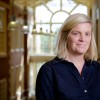This article is more than 5 years old.
As the air turns crisp, I wanted to highlight some of the great collaborative work that has been happening between Special Collections and Archives and Resource Services this past Spring and Summer. In the Spring, Audra and Carolyn teamed up to begin exporting MARC records from the Archivists’ Toolkit. It was the beginning of a wonderful relationship.
Since the Spring, we have used the new knowledge of the “MARC export” button in AT to make our finding aids available on multiple discovery layers. The original “test” finding aid was the Giuseppe De Santis papers finding aid. It can be found in WakeSpace, the catalog, and WorldCat.
As this was successful, we decided to move forward on a large scale project to make all of the newly completed finding aids available in each of these three locations. The “CRMF Project” (Church Records Microfilm) is an effort to take all of the paper finding aids (if ever created), transcribe the information into Archivists’ Toolkit, have Carolyn add name and subject headings, export the EAD to DSpace, and export the MARC to Voyager and OCLC. We examined the workflow and have successfully made the following church records (and one manuscript collection) available in all three discovery layers.:
Mount Carmel Baptist Church (Troy, N.C.) records
Sanford First Baptist Church (Sanford, N.C.) records
Zion Baptist Church (Shelby, N.C.) records
Shell Point Baptist Church (Shalotte, N.C.) records
Lee Park Baptist Church (Monroe, N.C.) records
Piney Green Baptist Church (Salemburg, N.C.) records
Hamlet Second Baptist Church (Hamlet, N.C.) records
Approximately 50 new church record finding aids have been added to DSpace and will soon be in Voyager and WorldCat. The extraordinary students in Special Collections have been working hard to continue adding information to Archivists’ Toolkit. Over 200 out of approximately 1000 church record microfilm collections have digital finding aids and are in the queue for addition to DSpace, Voyager, and OCLC.
None of this could be done without the thorough and hard work of Carolyn McCallum. She is integral to completing the steps of the workflow. We are so happy to be collaborating with Resource Services to push our materials out to more patrons and make our sometimes “hidden collections” accessible to as many people as possible. Soon one of our most highly used collections will have complete online finding aids!

4 Comments on ‘New MARC Records!’
Great work all!
Carolyn is indeed an asset to all of ZSR!
You have a great collaboration underway! Thanks for sharing this.
Well done, one and all!